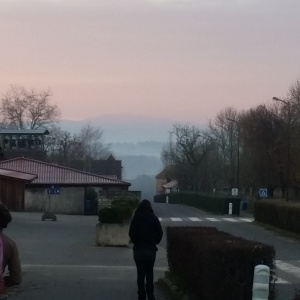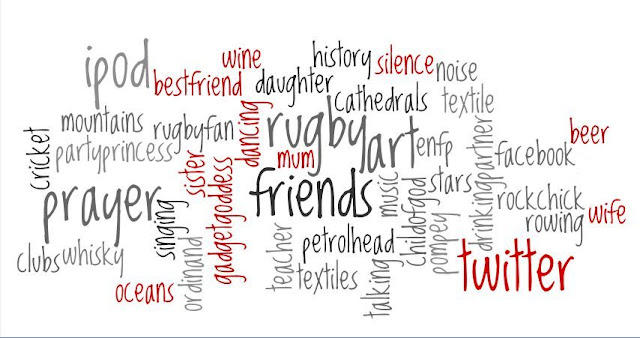

‘My kingdom is not from this world. If my kingdom were from this world, my followers would be fighting to keep me from being handed over to the Jews. But as it is, my kingdom is not from here.’
If there’s one thing we can guarantee in the news at the moment it’s the topic of Brexit, it seems to dominate every bit of discussion, every news programme, all the comedy.
Whether you voted in or out
whether you prefer hard or soft,(is it just me that thinks of eggs there?)
are prepared to risk a no deal or would rather we abandoned the whole thing
it’s certainly something that is important in our national life right now.
One of the central points of contention is free movement, the right of all EU citizens to live and work in other member states -the burgundy passports that show that whatever language is inside, and badge on the cover we’re all identified as Citizens of Europe
& of course for Brexiteers the return of the blue passport would be an identification that we are British citizens, with all that that implies.
Today we celebrate the Feast of Christ the King. The last Sunday in the church year, when we remember again that ultimately Jesus is King, that he reigns, that we will see that reign fulfilled and that we live, we are called to live as citizens of his kingdom,
We don’t carry a passport or identity papers, but we live as citizens of the Kingdom, so that our identity is noticed and known.
So what does it mean, what is this Kingdom and how are we to be its citizens?
Over the last few weeks our gospel readings have dwelt on the subject of the Kingdom of God,
Speaking of the Kingdom was one of the things that Jesus spent a lot of time doing, he talked about the fact that he was establishing the Kingdom, that the Kingdom was near,
And that the kingdom was in the future –
the Kingdom of God is both now, in and with us, and not yet, still to be fulfilled when heaven & earth are made new and Jesus reigns over all, bringing to fruition the victory he has already won, but we wait to fully know.
The Kingdom of God exists not just at some unspecified far off time, but now , today, this week.
International and domestic politics, terrorism and war reminds us of the capacity of humankind of hatred and evil.
But there is much too that illustrates our capacity for good – we are after all made in God’s image, however chipped and tarnished that image might be.
So what does it mean to live as citizens of the Kingdom of God?
We can so often try to be a prophetic voice for change, but every time we are confronted by our own rubbish, inadequacy. . we feel that we are unable to stand up for what is needed, what we know is right, it us hard to go against the flow.
We can get angry and upset about the state of the world-
There is nothing wrong with righteous anger, with calling out, injustice with campaigning – nothing at all.
but often we can hide behind it, because it can hide us, protect us, justify us not actually living the way that a citizen of the kingdom should live. We get angry and speak out, instead of living in a way that grows the kingdom of God.
We can convince ourselves that it is enough, or we can use it to try & kid ourselves that we’ve got it sewn up, we’re morally and spiritually sorted, we’re on the “ right” side of various ideas and issues.
But we are broken humans, in need of forgiveness and mercy each one of us. No better than anyone else. Always works in progress.
But , If Jesus is Lord of our lives, King of the Kingdom, then we are challenged to live the way he has taught us to live.
And the hardest but most defining attribute of the Kingdom of God and its citizens is this:
Love your enemies
Pray for those who persecute you
Not just the strangers and the foreigners, we can maybe cope with loving them, caring for the homeless, the refugees, at a distance, doing the right thing…
But what when it’s a all a bit closer to home?
Jesus asked us to love our neighbours & our enemies,
We don’t get to pick & choose who our neighbour is, and we certainly don’t get to choose our enemies.
Sometimes its just as hard to love our neighbours, the people in the chairs next to us, the people we see every day, our friends and families.
What happens when we disagree, fall out (as we will do) what then, how do we love how do we live as citizens of the Kingdom.? How do we live when our neighbour becomes our enemy, just for a moment, in a meeting over an issue?
As Christians, we know , we are convinced, and we need to live in the knowledge, that evil will not be defeated by bigger, better weapons, higher fences, greater security.
We know too that personal power, control and self interest is not the way to conduct our relationships,
But its hard… so so hard.
The thing that wins ultimately is costly, self sacrificial love.
The love that God showed on a wooden cross at a Roman execution,
ushering in a kingdom with a crown of a thorns and a cross as a throne.
living by this code, loving this way is what really marks us as citizens of this Kingdom…
Jesus calls us as citizens of his kingdom to live in a radically different way.
Not one that is easy. It’s not a way of living or thinking that comes easily to us, comes naturally.
But he told us, “my Kingdom is not of this world”
If Christ the King does not rule over a radically different, world changing Kingdom, then what is the point?
There are a thousand “little bit better” societies and rules that now lie in waste along the road of history.
Christ as King on the other hand, turns the whole load on its head.
“Father forgive,”
And so our lives in him should be lived to that tune,
So impossible in our own strength, by our own will
But in his strength, by his grace, world changing, life giving and Kingdom building.
As you begin a period of vacancy, a little uncertainty perhaps
I’d like to remind you, encourage you, that you are citizens of the Kingdom of God,
your identity is in Jesus, and in living his kingdom values, even when that seems the hardest thing to do.
Keeping your eyes and hearts focussed on the Kingship of Christ in your lives and the life of this community is the only way to live.
Loving your enemies, forgiving those who hurt you
Listening to those you disagree with, working together.
Nothing that happens in the next months matters unless it is rooted in living for the Kingdom;
where leadership is about serving, not power,
where love, justice and mercy are defining values.
Where our own agendas drop away so that we work together to build faith, community and the Kingdom of God.
The hymn puts it like this -“self on the cross & Christ upon the throne”
You have everything you need in Him, see where He leads, don’t get in the way –
you have future and a hope as individuals and as part of the church in this city,
you have within you the gifts abilities and faith that God has used, can & will use.
Seek first the Kingdom and its righteousness, and everything will be added to you.
This is Christ’s Church, and he holds it,
Keep him at the centre, live as citizens of his kingdom, and all will be well, all manner of things shall be well





